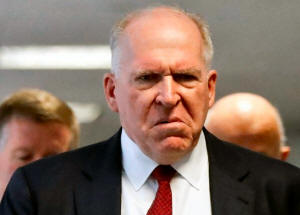|
Targeting critics, Trump threatens
ex-officials' security clearances
 Send a link to a friend
Send a link to a friend
 [July 24, 2018]
By Steve Holland and Jonathan Landay [July 24, 2018]
By Steve Holland and Jonathan Landay
WASHINGTON (Reuters) - The White House on
Monday threatened to strike back at critics of President Donald Trump's
contacts with Russia by revoking the security clearances of six former
U.S. officials, drawing accusations that he was abusing his power and
aiming to stifle dissent.
Trump has targeted the former U.S. intelligence and law enforcement
officials, White House spokeswoman Sarah Sanders said, because they have
"politicized and in some cases monetized their public service and
security clearances, making baseless accusations of improper contact
with Russia or being influenced by Russia."
Among them is John Brennan, who headed the CIA under Trump's predecessor
Barack Obama and was one of the most vocal critics of Trump's
performance at his summit last week with Russian President Vladimir
Putin in Helsinki. After Trump gave credence to Putin's denial of
meddling in the 2016 U.S. election despite findings by the U.S.
intelligence community, Brennan called the Republican president's
remarks "nothing short of treasonous."

Trump's threat against Brennan and former U.S. officials James Comey,
James Clapper, Michael Hayden, Susan Rice and Andrew McCabe represented
an extraordinary politicization of the U.S. government's security
clearance process. Critics called it petty and unprecedented.
"An enemies list is ugly, undemocratic and un-American. Is there no
length Trump will not go to stifle opposition?" asked U.S.
Representative Adam Schiff, the top Democrat on the House Intelligence
Committee.
Sanders, who said Trump is "exploring the mechanisms" to remove the
security clearances, made reference to Brennan's treason comment in
explaining the president's threat. Asked if Trump was punishing the
former officials because of their criticism, Sanders said, "No, I think
you are creating your own story there."
Trump came under criticism after Helsinki, including from many fellow
Republicans. One of the few who publicly sided with him last week,
Senator Rand Paul, said he met with Trump on Monday and asked him to
revoke Brennan's security clearance.
'A TERRIBLE PRECEDENT'
Many former U.S. officials retain security clearances after leaving
government service because they continue to advise their former agencies
or because it is a condition of employment as government contractors or
consultants. Stripping the clearances also would represent a public
rebuke of the officials and sever a connection with the intelligence
community.
"Clearances are taken away for security violations, usually after an
investigation," former deputy CIA director John McLaughlin said on
Twitter. "These people do not talk classified publicly. It would be
political punishment infringing on first amendment rights. It's
something Putin would do."
The U.S. Constitution's First Amendment protects free speech.
Some of targeted officials appeared to no longer have security
clearances. Comey, who Trump fired as FBI director last year, has said
he does not have one, his friend Benjamin Wittes said on Twitter. Comey
has become a prominent critic, calling Trump "morally unfit to be
president."
Clapper, who stepped down as director of national intelligence before
Trump took office last year, called revoking security clearances "just a
very, very petty thing to do."
[to top of second column]
|

Former CIA Director John Brennan arrives for a Senate Intelligence
Committee hearing evaluating the intelligence community assessment
on "Russian Activities and Intentions in Recent US Elections" on
Capitol Hill in Washington, U.S., May 16, 2018. REUTERS/Leah Millis

"There is a formal process for doing this, but you know I guess
legally the president has that prerogative," Clapper said on CNN.
"He can suspend or revoke clearances as he sees fit, and if he
chooses to do it for political reasons, well I think that's a
terrible precedent. And it's a very sad commentary. And it's an
abuse of the system."
Hayden, a former director of the CIA and National Security Agency
and a retired four-star Air Force general, said he was unbowed.
"I don't go back for classified briefings," he wrote on Twitter.
"Won't have any effect on what I say or write.".
Rice was former President Barack Obama's national security adviser.
McCabe, who as the former No. 2 FBI official was involved in the
agency's investigation of Russia's role in the 2016 U.S. election,
was fired by Attorney General Jeff Sessions in March.
A spokeswoman for McCabe, Melissa Schwartz, wrote on Twitter his
security clearance was deactivated when he was terminated, according
to what they were told was FBI policy.
Robert Mueller, the special counsel appointed by the Justice
Department after Comey's firing, is investigating Russia's role in
the 2016 election and whether Trump's campaign collided with Moscow.
Trump has called the probe a witch hunt and denied collusion.
Both the CIA and the Office of the Director of National
Intelligence, which oversees all U.S. intelligence agencies, said
they had no comment on Trump's threat.

Some Democrats criticized the proposal as a deflection tactic to
change the conversation around what Trump may have agreed with Putin
in their two-hour, one-on-one meeting.
"This is absolute nonsense, and we shouldn't fall for it," said
Rachel Cohen, spokeswoman for Senator Mark Warner, the senior
Democrat on the Senate Intelligence Committee.
Democratic Senator Mazie Hirono was one of the fiercest critics,
writing on Twitter, "This is what totalitarianism looks like."
(Additional reporting by Doina Chiacu, Eric Beech and Warren
Strobel; Writing by Lisa Lambert and Mary Milliken; Editing by Will
Dunham)
[© 2018 Thomson Reuters. All rights
reserved.]
Copyright 2018 Reuters. All rights reserved. This material may not be published,
broadcast, rewritten or redistributed.
Thompson Reuters is solely responsible for this content.
 |